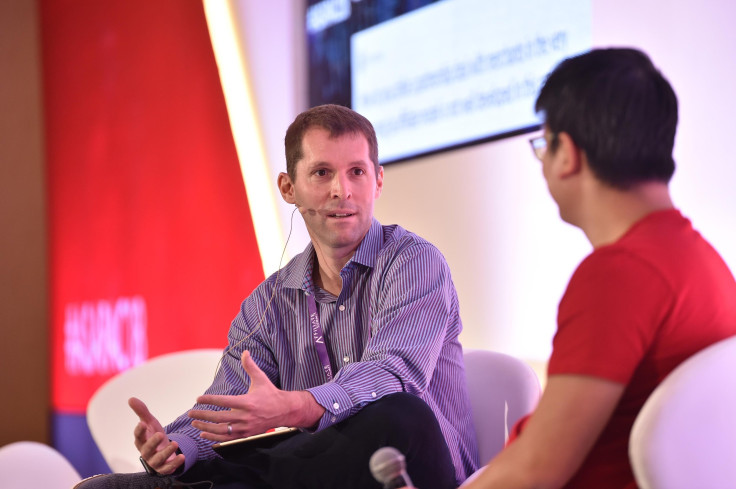Standing United
Accelerated Partners founder sees Ukraine as a call to action for business, too.

It’s been heartbreaking to watch the senseless war and ensuing humanitarian crisis in Ukraine, especially as the situation grows more dire with each passing day. However, it is often when things seem darkest that we see the greatest acts of courage and morality. This crisis presents an opportunity for socially conscious organizations and leaders to step up and help others.
Many individuals, leaders and organizations have risen to this challenge. While it has been difficult to witness the needless destruction of lives, homes and livelihoods, there is a glimmer of hope in how so many around the world have stood united against Russia’s unprovoked aggression and rallied to help the people of Ukraine.
Simply put, this type of unity was hardly guaranteed. We’re in an environment of increased individualism over the last decade and a resurgence in populist leaders globally. The physical and mental separation of two years of pandemic life has deepened our divisions and weakened our collective empathy. Recently, these developments reached a crisis point where our viewpoints have become so entrenched, and so polarized, that I’ve been losing faith that people can objectively agree upon what is morally right and wrong, even in the most basic examples.
And yet, the war in Ukraine has been a globally unifying event unlike anything we’ve seen in decades--perhaps even more so than the pandemic, which became dominated by political infighting, disrespect and selfishness. Overnight, we have reset our collective moral compass and have clearly identified the moral side of the conflict. Perhaps more importantly, the crisis has shocked us out of our cynicism and replaced it with a deep sense of empathy and humanity.
During this time of great tragedy, it is inspiring to look to the people who go above and beyond for their fellow human beings. I have personally been inspired by these changes in behavior and responses to the crisis.
- The inspiring leadership of Ukrainian President Volodymyr Zelenskyy, a former actor and comedian who has only served in politics for three years. Zelenskyy has rejected multiple offers to evacuate from the country since the invasion began and puts his life on the line daily to stand with his people and defend his country. Just this weekend, he walked the streets of Kyiv and visited wounded soldiers, inspiring his constituents to maintain their fierce resistance against a far more fortified opponent. Conversely, Russian President Vladimir Putin, who initiated the war, remains heavily guarded in an undisclosed location, hiding from his own people.
- The thousands of Russian citizens who risked persecution to march in the streets in opposition of Putin’s war, and are trying to hold their government accountable at significant personal risk.
- The heroic stories of ordinary citizens who put their lives at risk to help get people to safety both inside and outside of Ukraine. This includes renowned chef José Andrés, founder of World Central Kitchen, who is currently in Poland helping to feed refugees arriving from Ukraine.
- Citizens of countries such as Romania, Poland and Moldova, who are opening their homes to refugees and bringing them into their families. This generosity was exemplified by this now famous photo of baby gear at a Polish train station, left for parents crossing the border from Ukraine with children in their arms and little else.
- In America, I’ve been heartened to see many politicians from both parties speaking in agreement on the crisis and finding bipartisan solutions. While some have regrettably tried to politicize the crisis, there is more unity on this issue than I’ve seen in American politics in recent memory.
- Hundreds of companies have decided to pause operations in Russia or withdraw from the country entirely, essentially forcing Russia to sacrifice its economic future to continue its senseless war. BP, which has a checkered history in the United States due to its 2010 oil spill, abandoned a 20% stake in a Russian oil company, a move that could cost them $14 and $25 billion. The Ford Motor Company ceased all operations in Russia and pledged to donate to help Ukrainian refugees. Airbnb paused all operations in Russia and Belarus, and also made headlines for offering free shelter to 100,000 refugees. And Visa, Mastercard, Discover and American Express all shut down transactions with Russian banks, specifically responding to President Zelenskyy’s plea.
- Russia’s aggression has accelerated the urgency to shift to sustainable energy and reduce our dependency on fossil fuels. Most of the largest oil exporting countries are led by authoritarian regimes with poor human rights records, and many leaders are finally realizing the humanitarian consequences of doing business with, and enriching, these suppliers. Additionally, as we are being told we have only a few years to drastically reduce the emissions we expel into the atmosphere before the damage becomes irreversible, the sudden spike in oil prices has created a free market impetus for countries, businesses and individuals to invest more heavily in sustainable energy projects.
While I hope this war comes to a quick and peaceful end, I also simultaneously wish that the behavior changes that have emanated from this tragedy will not fade in the coming months or years. This rise in unity and empathy is exactly what’s needed to address the world’s most pressing problems. While Putin’s invasion is an atrocity, the world’s humane, unified and innovative response will hopefully serve as a building block for a more peaceful, tolerant and harmonious future.
(Robert Glazer is the founder and immediate past CEO of Acceleration Partners.)
© Copyright IBTimes 2024. All rights reserved.






















